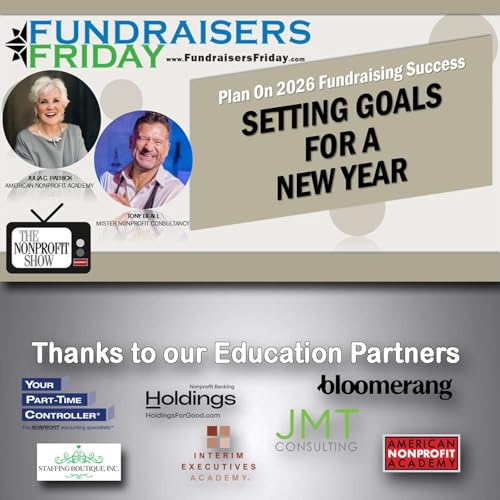
The Nonprofit Show
Failed to add items
Add to basket failed.
Add to Wish List failed.
Remove from Wish List failed.
Follow podcast failed
Unfollow podcast failed
-
Narrated by:
About this listen
The Nonprofit Show is the nation’s daily broadcast for the business side of nonprofits — bringing you practical insights, expert interviews, and real-world strategies to help your organization run smarter, lead stronger, and fund better.
Each weekday, our co-hosts and guests break down the most current topics in fundraising, board governance, leadership, staffing, technology, communications, and financial strategy — giving nonprofit professionals the tools they need to build sustainable, high-performing organizations.
With more than 1,400 episodes and growing, our on-demand library is a trusted resource for executive directors, team members, fundraisers, board members, and sector leaders who are ready to move beyond inspiration and into implementation.
🎥 Watch the daily show on YouTube: https://bit.ly/3A0Dqlw
© 2025 American Nonprofit Academy-
 Dec 19 202530 mins
Dec 19 202530 minsFailed to add items
Sorry, we are unable to add the item because your shopping cart is already at capacity.Add to basket failed.
Please try again laterAdd to Wish List failed.
Please try again laterRemove from Wish List failed.
Please try again laterFollow podcast failed
Unfollow podcast failed
-
 33 mins
33 minsFailed to add items
Sorry, we are unable to add the item because your shopping cart is already at capacity.Add to basket failed.
Please try again laterAdd to Wish List failed.
Please try again laterRemove from Wish List failed.
Please try again laterFollow podcast failed
Unfollow podcast failed
-
 31 mins
31 minsFailed to add items
Sorry, we are unable to add the item because your shopping cart is already at capacity.Add to basket failed.
Please try again laterAdd to Wish List failed.
Please try again laterRemove from Wish List failed.
Please try again laterFollow podcast failed
Unfollow podcast failed


